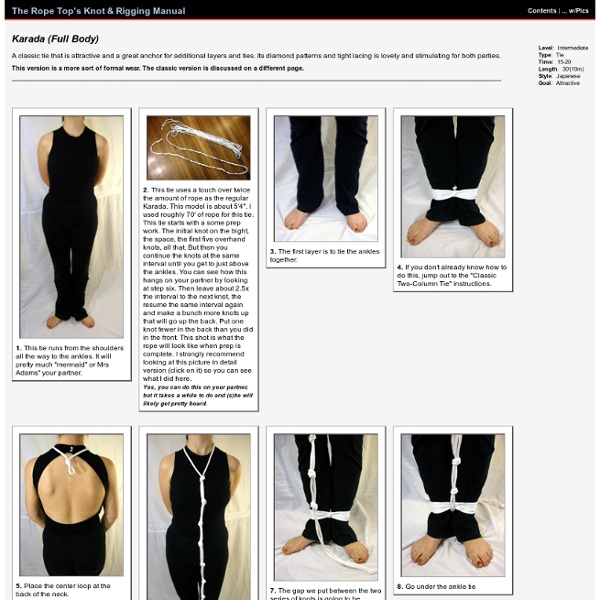Karada (Full Body)

Rope Collar
Rope Collar This is a special application of the Turk's Head knot. Before you attempt to make a collar, please go through the Turk's Head tutorial and practice it first. WARNING: This is IMPORTANT: Placing things around the neck can be dangerous! Level: AdvancedType: KnotTime: 20+Length: 30'(10m)Goal: Attractive 1.To make a rope collar start with a thin cord, 1/8 inch or so. 2.You may want to die the cord to a fashion color : ) Also, you may elect to weave a D-Ring onto it, but this isn't really needed (see the last few images below) 3.You will need a length of rope approximately 15 times the length needed to wrap around the target once 4.Start with three loops about 50% larger than the target. 5.Place the short end over the middle and under the long end as shown 6.Hold the cords so they cannot move around as you do the next step 7.Tuck the lower cord under the upper and begin weaving as you did for your practice Turk's Head. 8.Continue to weave the first wrap... 9.Continuing... 13.Third shot.
Hon Kikkou "Tortoise Shell"
Hon Kikkou As I understand it, "Hon Kikkou" translates as "The Official Tortoise Shell". This is an attractive and rare tie that I ran across on the Angle Rope website years ago. Level: AdvancedType: TieTime: 15-20Length: 50'(17m)+Style: JapaneseGoal: AttractiveBodyType: Flexible 1.Start with a standard Lark's Head knot, wrapped around the waist, just below the rib cage 2.Wrap around once 3.Pull the trailing ends through the bight 4.Loop around and through the wrap you just completed 5.Pull the rope straight up and put an overhand knot by the breastbone 6.Lay one strand over each shoulder 7.Cross the strands behind 8.Cross the arms and wrap the rope ends underneath them 9.Bring the ends to the front and thread through rope near the neck 10.Pull the ends out so that the rope line forms a "U" shape 11.Lock this position by threading the ends under the rope you just tightened 12.Do this on both sides 13.Then pull the ends up over the shoulders again 15.This time you thread the ends under the breasts 21.
Karada (Rope Dress)
1.This model is about 5'4". I used about 30-35' of rope for this tie. Start with a bight in the middle. 2.Make an overhand knot to hold the middle point. 3.Place the end of the loop in the middle of the shoulder blades 4.Drape the two sides of the rope on either side of the neck 6.The knot should be just below the clavical when the loop at the back is between the shoulder blades 8.Tie another overhand knot. 9.Add another knot at the same interval as was between the firs tand second 11.When you are at about hip level, you stop putting knots at regular intervals and add one more optional knot that is intended to be positioned on the clit to make the dress more interesting or the wearer 12.Run the rope between the legs. 13.Bring the ropes up the back and through the starting loop. 14.Bring the strands through the space between the first and second knots in the front 15.Separate the strands again 16.You can just proceed with the next step or, optionally, add a decorative twist.
Related:
Related:



